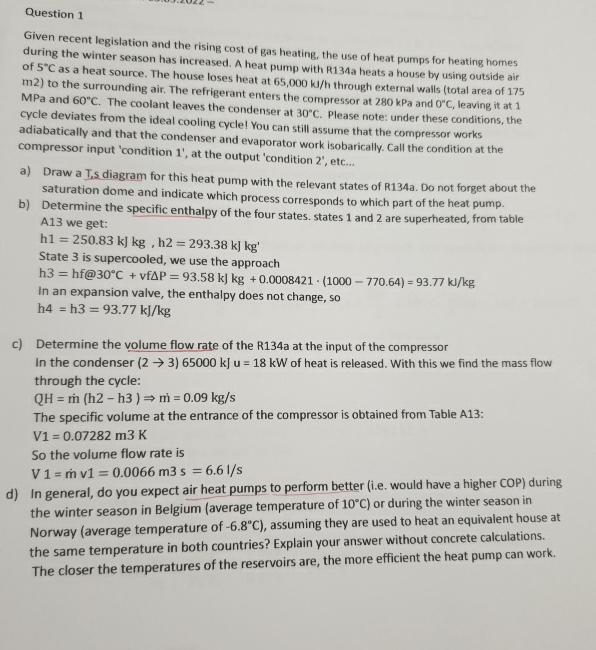Answered step by step
Verified Expert Solution
Question
1 Approved Answer
Question 1 Given recent legislation and the rising cost of gas heating, the use of heat pumps for heating homes during the winter season

Question 1 Given recent legislation and the rising cost of gas heating, the use of heat pumps for heating homes during the winter season has increased. A heat pump with R134a heats a house by using outside air of 5C as a heat source. The house loses heat at 65,000 kJ/h through external walls (total area of 175 m2) to the surrounding air. The refrigerant enters the compressor at 280 kPa and 0C, leaving it at 1 MPa and 60C. The coolant leaves the condenser at 30C. Please note: under these conditions, the cycle deviates from the ideal cooling cycle! You can still assume that the compressor works adiabatically and that the condenser and evaporator work isobarically. Call the condition at the compressor input 'condition 1', at the output 'condition 2', etc... a) Draw a Ts diagram for this heat pump with the relevant states of R134a. Do not forget about the saturation dome and indicate which process corresponds to which part of the heat pump. b) Determine the specific enthalpy of the four states. states 1 and 2 are superheated, from table A13 we get: hl= 250.83 kJ kg , h2 = 293.38 kJ kg' State 3 is supercooled, we use the approach h3 = hf@30C + vfAP = 93.58 kJ kg +0.0008421 (1000-770.64)= 93.77 kJ/kg In an expansion valve, the enthalpy does not change, so h4 = h3 = 93.77 kJ/kg c) Determine the volume flow rate of the R134a at the input of the compressor In the condenser (23) 65000 kJ u = 18 kW of heat is released. With this we find the mass flow through the cycle: QH = m (h2-h3 ) = m = 0.09 kg/s The specific volume at the entrance of the compressor is obtained from Table A13: V1 = 0.07282 m3 K So the volume flow rate is V1 m v1=0.0066 m3 s= 6.61/s d) In general, do you expect air heat pumps to perform better (i.e. would have a higher COP) during the winter season in Belgium (average temperature of 10 C) or during the winter season in Norway (average temperature of -6.8C), assuming they are used to heat an equivalent house at the same temperature in both countries? Explain your answer without concrete calculations. The closer the temperatures of the reservoirs are, the more efficient the heat pump can work.
Step by Step Solution
There are 3 Steps involved in it
Step: 1

Get Instant Access to Expert-Tailored Solutions
See step-by-step solutions with expert insights and AI powered tools for academic success
Step: 2

Step: 3

Ace Your Homework with AI
Get the answers you need in no time with our AI-driven, step-by-step assistance
Get Started


